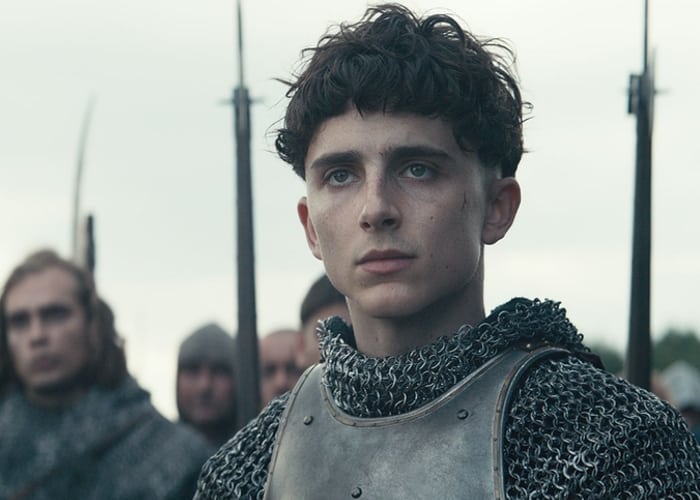
Ever since his award-winning role as Elio in Luca Guadagnino’s Call me by your Name, Timothée Chalamet has been considered Hollywood royalty. Soon, that title is going to take on a new meaning. The actor stars in David Michôd’s The King, a Netflix period piece borrowing material from multiple plays by William Shakespeare focused on the life of Henry V of England.
With the role, Chalamet has been given the opportunity to follow in the footsteps of kings both literal and cinematic: King Henry V snatched the French throne in 1415 against all odds, while Sir Laurence Olivier snatched an honorary Oscar in 1947 for bringing the character to life on the big screen, as star, director, and producer of his adaptation of Henry V.
There’s nothing like a good Shakespeare adaptation. Since the first films of his work in the late 1800s, there have been more than 400 cinematic adaptations of the Bard’s plays. His writing has inspired gems from the giddy and hilarious 10 Things I Hate About You (a modernized high-school take on The Taming of the Shrew) to Kenneth Branagh’s ambitious four-hour adaptation of Hamlet.
But he is also responsible for some perception of history. His plays and their adaptations have preserved such figures as Julius Caesar, Mark Antony, and Cleopatra in our imaginations while also helping us remember otherwise obscure rulers, such as Macbeth of Scotland and the early British King Cunobeline, aka Cymbeline.
Shakespeare wrote 10 English history plays (officially), three of which involve Henry V. When we first meet him as “Hal” (yes, he even has a badass nickname) in Henry IV Parts 1 and 2, he is a playboy prince. After all the fun and games, he was crowned King Henry V, and as depicted in his eponymous play, led his men to victory at the Battle of Agincourt in 1415, beating the French on their own turf while vastly outnumbered.
Henry V was such a commanding hero that in 1944, five years into World War II, the British government helped fund Olivier’s screen adaptation of the play as a morale booster.
Which brings me back to teen heartthrob Timothée Chalamet. Though he has proven himself an actor worthy of recognition, any Henry V-stan can tell you he is not the actor who first comes to mind when imagining the king who could convince an army of men to march headfirst into a fire pit for him.
To get around this, Chalamet’s Hal looks to be more of a representation of the ethical murkiness of the gift of total power, at least in the early days of his reign. This reexamination of the masculinity often seen in the God-like Shakespearean hero makes way for a nuanced character, tugged at from all the ends of his moral compass.
At 23 years old, Chalamet is notably younger than his predecessors in the role, (Branagh was 29 when he addressed his band of brothers in a 1989 film; Tom Hiddleston was 31 in the series The Hollow Crown; Olivier’s portrayal was at age 37). So, why cast him as opposed to the plethora of seasoned, brooding, stubble-cheeked Hollywood men who have been playing adult leads for a decade now and are ripe for a period piece?
To the story of Henry V, Chalamet’s age might just be an asset. His youthfulness adds an interesting divergence to the iconic role and forces the audience to ask: how can a lack of experience affect a position of such great power? And what does it mean when such young men are thrust into positions of power on the killing fields in the first place?
Chalamet’s Henry V is a quick learner, and, when his country needs him, he is ready to step up to the plate. By choosing such a young actor to play the king, Michôd is able to depict Henry’s rise from a boy to a monarch, from a seeker of friends to a leader of followers, from Hal to His Highness, reminding us that a king is merely a person, after all… a person with a very important job.
By showing us the boy within this king, Michôd invokes sympathy and gives a more relatable and nuanced edge to a hero, who, in Shakespeare’s telling transitions absolutely from boy to man in the bat of a royal eye. After all, what is more heroic than a child rising to the role of adulthood? It’s easy for Olivier to push people around, but Chalamet? Well, that would really be something.
Related Topics: Netflix, Trailers

